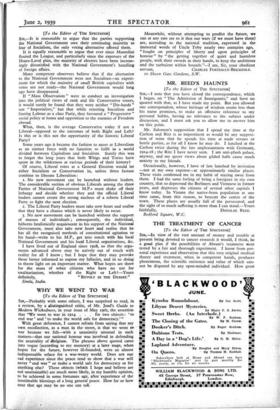WHY WE WENT TO WAR
[To the Editor of THE SPECTATOR]
SIR,—Probably with some others, I was surprised to read, in a review, by a distinguished critic, of Mr. Joad's Guide to Modern Wickedness, in your issue of May 19th, the assertion that "We went to war in 1914 . . . for two objects : 'to end war' and `to make the world safe for democracy."
With great deference, I cannot refrain from saying that my own recollection, as a man in the street, is that we went war because we felt—with a unanimity unusual in such matters—that our national honour was involved in defending the neutrality of ,Belgium. The phrases above quoted came into vogue (according to my memory) at a later stage, when hopes for the future, however ill-founded, were an almost indispensable solace for a war-weary world. Does not our sad experience since the peace tend to show that a war will never " end war " or make a world safe for democracy or for anything else? These objects (which I hope and believe are not unattainable) are much more likely, in my humble opinion, to be achieved in some fortunate age, after experience of the inestimable blessings of a long general peace. How far or how near that age may be no one can tell.
Meanwhile, without attempting to predict the future, we can at any rate see to it that our wars (if we must have them) are, according to the national tradition, expressed in the immortal words of Uncle Toby nearly two centuries ago, " fought on principles of liberty and upon principles of honour " by " the getting together of quiet and harmless people, with their swords in their hands, to keep the ambitious and the turbulent within bounds."—I am, Sir, your obedient










































 Previous page
Previous page